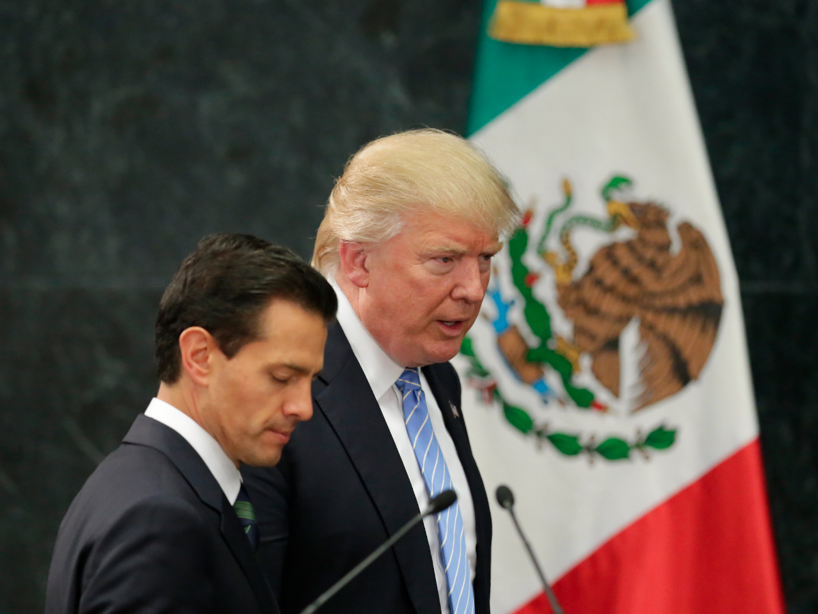Photo: Reuters/Henry Romero
In my class with the Strauss Center’s Mexico Security Initiative[1], my classmates and I are fine-tuning our policy report for the upcoming 2018 Mexican elections. Set against the backdrop of brutal crime and cartel violence, our project focuses on strategies for the next Mexican administration regarding several key policy arenas—economic, security, civil society, and political— that can be adopted to improve the situation for citizens’ safety. But Trump’s unanticipated victory in the 2016 US presidential elections has dramatically altered the decision-making calculus of US-Mexico relations. A cornerstone of the class is the chance to hear expert testimony and specialized expertise from several prominent guest speakers throughout the semester. This has allowed my classmates and I to cultivate an in-depth understanding of the US-Mexico relations, especially where they concern issues of national security. Of particular interest, and perhaps pertinence, to the Strauss Center’s project is the insight we have gained in regards to some chronic problems plaguing Mexico, namely corruption and impunity. These kinds of ongoing threats to security and stability are all too commonplace in Mexico, and affect the successful implementation of measures designed to improve the safety and well-being of Mexican citizens, like police reform.
In this context, I have continued to examine the Merida Initiative and US-Mexico binational security cooperation, building on my previous work at the Strauss Center. I also research the role of regional security cooperation throughout Central America, within the framework on drug and cartel-related violence. The past couple of weeks have introduced some big changes, not the least of which is that Mr. Donald J. Trump is the 45th President of the United States, and it will be interesting to see the regional relational shift between the US and her Latin American neighbors. Mr. Trump’s victory will affect US policy for the next 4 years, both at home and abroad. During his campaign, and now as Chief Executive, President Trump has more than once made inflammatory and demeaning remarks about Mexicans and their country. Unsurprisingly, many Mexicans are deeply concerned about what a Trump administration will mean for US-Mexico relations. Trump’s foreign policy trajectory in the coming months will influence several important areas of cooperation, including security, immigration, trade, health, business, and commerce. Currently, news reports[2] are saying that Mexico is in the process of crafting a grand strategy for dealing with the nascent Trump administration. And Mexico, a large country with global aspirations, should not be taken lightly. To be certain, Mexico’s relationship with the United States will always be a consequential one. But Mexico has its eyes on the possibility of regional alliances as well. It is very possible that Mexico could be more strategic in its leadership and involvement with both its regional neighbors—like the Central American countries of Guatemala, Honduras, Nicaragua, etc.—and its fellow Spanish-speaking neighbors (such as Colombia, Venezuela, and Peru).
If a Trump administration becomes increasingly hostile towards Mexico, Mexico could strategically pivot towards its southern Latino neighbors in Central and South America, forsaking US relations for the possibility of pan-Latin alliances. These regional alliances, with Mexico at the center, would be built on a platform of multilateral issues, like security, intelligence sharing, immigration, and trade. Mexico occupies a strategically and geographically important position, sitting at the crossroads between North and Central/South America. Additionally, as I have seen throughout my research and interviews with Mexican security experts, it’s become increasingly salient that tackling cartel violence and transnational criminal organizations is all at once a local and regional/multinational endeavor. It is a well-documented fact that drug routes flow both up and down, and throughout the North and South American region, forming a web of crime that necessarily involves the cooperation of several states. Thus, I argue that improving the security of the US, Mexico, and the Americas at-large requires solutions to complex and systemic issues that have long plagued Mexico and its neighbors—namely, drugs, trafficking, violence, and poverty. These solutions must have both a local component, as well as a regional/multinational component in order to effect real change and consolidate the region’s safety and security.
From the start of his new administration, President Trump has greatly imperiled the US-Mexico relationship. Claiming that he will build a wall[3] on the US border with Mexico, eliminate NAFTA[4], and deport illegal immigrants back to Mexico[5], President Trump has caused an impressive amount of damage in five short weeks. Just over a month into his term, and it would appear Trump is keen on keeping his promises. He has vowed to build a wall, renegotiate the terms of NAFTA, and this week, the administration and the Department of Homeland Security issued directives that greatly expanded enforcement of US immigration laws; these laws could potentially lead to the expedited removal of any undocumented immigrant throughout the United States. With the arrival this week of Secretary of State Tillerson, and DHS Secretary Kelly to Mexico on a diplomatic mission, there has already been significant pushback from Mexican government officials. We shall see what the next few years of the Trump administration will hold for US-Mexico relations. But so far, it doesn’t look very promising.
Edited by: Daniel Jimenez
[1] https://www.strausscenter.org/strauss-articles/mexico-security-initiative.html
[2] https://www.usnews.com/news/best-countries/articles/2017-03-09/mexicos-plan-for-facing-donald-trump-resistance
[3] http://finance-commerce.com/2017/03/trump-budget-build-up-military-build-the-wall/
[4] http://www.nbcnews.com/politics/white-house/trump-sign-executive-order-plan-renegotiate-nafta-mexico-canada-n710641
[5] http://www.washingtontimes.com/news/2017/feb/22/mexico-vows-resist-trump-immigration-plans/


One reply on “US-Mexico Relations in the Trump Era—Where Do We Go From Here?”
Terrific job here. I really enjoyed what you had to say. Keep going because you definitely bring a new voice to this subject. Not many people would say what youve said and still make it interesting. Well, at least Im interested. Cant wait to see far more of this from you.